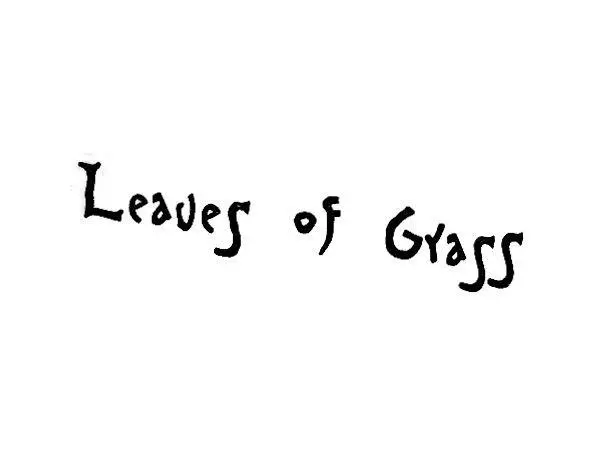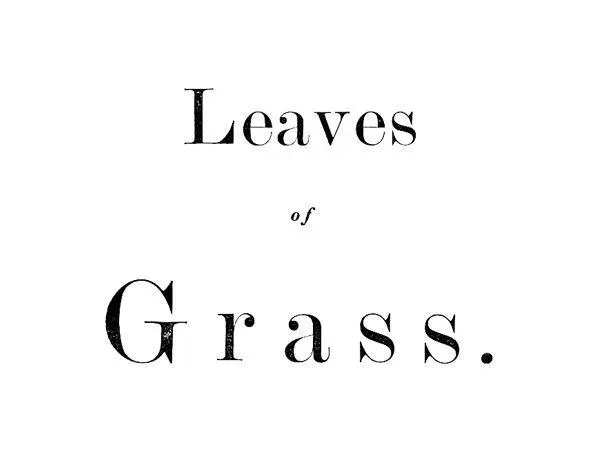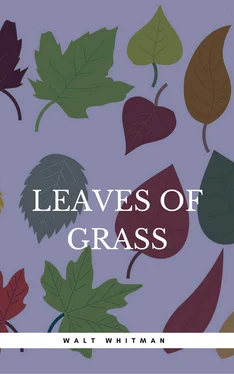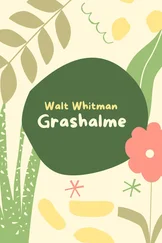Walt Whitman - Leaves of Grass
Здесь есть возможность читать онлайн «Walt Whitman - Leaves of Grass» — ознакомительный отрывок электронной книги совершенно бесплатно, а после прочтения отрывка купить полную версию. В некоторых случаях можно слушать аудио, скачать через торрент в формате fb2 и присутствует краткое содержание. ISBN: , Жанр: Языкознание, Критика, на английском языке. Описание произведения, (предисловие) а так же отзывы посетителей доступны на портале библиотеки ЛибКат.
- Название:Leaves of Grass
- Автор:
- Жанр:
- Год:неизвестен
- ISBN:9782377930524
- Рейтинг книги:4 / 5. Голосов: 1
-
Избранное:Добавить в избранное
- Отзывы:
-
Ваша оценка:
- 80
- 1
- 2
- 3
- 4
- 5
Leaves of Grass: краткое содержание, описание и аннотация
Предлагаем к чтению аннотацию, описание, краткое содержание или предисловие (зависит от того, что написал сам автор книги «Leaves of Grass»). Если вы не нашли необходимую информацию о книге — напишите в комментариях, мы постараемся отыскать её.
Leaves of Grass — читать онлайн ознакомительный отрывок
Ниже представлен текст книги, разбитый по страницам. Система сохранения места последней прочитанной страницы, позволяет с удобством читать онлайн бесплатно книгу «Leaves of Grass», без необходимости каждый раз заново искать на чём Вы остановились. Поставьте закладку, и сможете в любой момент перейти на страницу, на которой закончили чтение.
Интервал:
Закладка:
Walt Whitman
Leaves of Grass [Variorum Edition]

LEAVES OF GRASS
1855

Introduction
1855
America does not repel the past or what it has produced under its forms or amid other politics or the idea of castes or the old religions . . . . accepts the lesson with calmness . . . is not so impatient as has been supposed that the slough still sticks to opinions and manners and literature while the life which served its requirements has passed into the new life of the new forms . . . perceives that the corpse is slowly borne from the eating and sleeping rooms of the house . . . perceives that it waits a little while in the door . . . that it was fittest for its days . . . that its action has descended to the stalwart and wellshaped heir who approaches . . . and that he shall be fittest for his days.
The Americans of all nations at any time upon the earth have probably the fullest poetical nature. The United States themselves are essentially the greatest poem. In the history of the earth hitherto the largest and most stirring appear tame and orderly to their ampler largeness and stir. Here at last is something in the doings of man that corresponds with the broadcast doings of the day and night. Here is not merely a nation but a teeming nation of nations. Here is action untied from strings necessarily blind to particulars and details magnificently moving in vast masses. Here is the hospitality which forever indicates heroes . . . . Here are the roughs and beards and space and ruggedness and nonchalance that the soul loves. Here the performance disdaining the trivial unapproached in the tremendous audacity of its crowds and groupings and the push of its perspective spreads with crampless and flowing breadth and showers its prolific and splendid extravagance. One sees it must indeed own the riches of the summer and winter, and need never be bankrupt while corn grows from the ground or the orchards drop apples or the bays contain fish or men beget children upon women.
Other states indicate themselves in their deputies . . . . but the genius of the United States is not best or most in its executives or legislatures, nor in its ambassadors or authors or colleges or churches or parlors, nor even in its newspapers or inventors . . . but always most in the common people. Their manners speech dress friendships—the freshness and candor of their physiognomy—the picturesque looseness of their carriage . . . their deathless attachment to freedom—their aversion to anything indecorous or soft or mean—the practical acknowledgment of the citizens of one state by the citizens of all other states—the fierceness of their roused resentment—their curiosity and welcome of novelty—their self-esteem and wonderful sympathy—their susceptibility to a slight—the air they have of persons who never knew how it felt to stand in the presence of superiors—the fluency of their speech—their delight in music, the sure symptom of manly tenderness and native elegance of soul . . . their good temper and openhandedness—the terrible significance of their elections—the President’s taking off his hat to them not they to him—these too are unrhymed poetry. It awaits the gigantic and generous treatment worthy of it.
The largeness of nature or the nation were monstrous without a corresponding largeness and generosity of the spirit of the citizen. Not nature nor swarming states nor streets and steamships nor prosperous business nor farms nor capital nor learning may suffice for the ideal of man . . . nor suffice the poet. No reminiscences may suffice either. A live nation can always cut a deep mark and can have the best authority the cheapest . . . namely from its own soul. This is the sum of the profitable uses of individuals or states and of present action and grandeur and of the subjects of poets.—As if it were necessary to trot back generation after generation to the eastern records! As if the beauty and sacredness of the demonstrable must fall behind that of the mythical! As if men do not make their mark out of any times! As if the opening of the western continent by discovery and what has transpired since in North and South America were less than the small theatre of the antique or the aimless sleepwalking of the middle ages! The pride of the United States leaves the wealth and finesse of the cities and all returns of commerce and agriculture and all the magnitude of geography or shows of exterior victory to enjoy the breed of fullsized men or one fullsized man unconquerable and simple.
The American poets are to enclose old and new for America is the race of races. Of them a bard is to be commensurate with a people. To him the other continents arrive as contributions . . . he gives them reception for their sake and his own sake. His spirit responds to his country’s spirit . . . . he incarnates its geography and natural life and rivers and lakes. Mississippi with annual freshets and changing chutes, Missouri and Columbia and Ohio and Saint Lawrence with the falls and beautiful masculine Hudson, do not embouchure where they spend themselves more than they embouchure into him. The blue breadth over the inland sea of Virginia and Maryland and the sea off Massachusetts and Maine and over Manhattan bay and over Champlain and Erie and over Ontario and Huron and Michigan and Superior, and over the Texan and Mexican and Floridian and Cuban seas and over the seas off California and Oregon, is not tallied by the blue breadth of the waters below more than the breadth of above and below is tallied by him. When the long Atlantic coast stretches longer and the Pacific coast stretches longer he easily stretches with them north or south. He spans between them also from east to west and reflects what is between them. On him rise solid growths that offset the growths of pine and cedar and hemlock and liveoak and locust and chestnut and cypress and hickory and limetree and cottonwood and tuliptree and cactus and wildvine and tamarind and persimmon . . . . and tangles as tangled as any canebrake or swamp . . . . and forests coated with transparent ice and icicles hanging from the boughs and crackling in the wind . . . . and sides and peaks of mountains . . . . and pasturage sweet and free as savannah or upland or prairie . . . . with flights and songs and screams that answer those of the wildpigeon and highhold and orchard-oriole and coot and surf-duck and redshouldered-hawk and fish-hawk and white-ibis and indian-hen and cat-owl and water-pheasant and qua-bird and pied-sheldrake and blackbird and mockingbird and buzzard and condor and night-heron and eagle. To him the hereditary countenance descends both mother’s and father’s. To him enter the essences of the real things and past and present events—of the enormous diversity of temperature and agriculture and mines—the tribes of red aborigines—the weather-beaten vessels entering new ports or making landings on rocky coasts—the first settlements north or south—the rapid stature and muscle—the haughty defiance of ’76, and the war and peace and formation of the constitution .
Читать дальшеИнтервал:
Закладка:
Похожие книги на «Leaves of Grass»
Представляем Вашему вниманию похожие книги на «Leaves of Grass» списком для выбора. Мы отобрали схожую по названию и смыслу литературу в надежде предоставить читателям больше вариантов отыскать новые, интересные, ещё непрочитанные произведения.
Обсуждение, отзывы о книге «Leaves of Grass» и просто собственные мнения читателей. Оставьте ваши комментарии, напишите, что Вы думаете о произведении, его смысле или главных героях. Укажите что конкретно понравилось, а что нет, и почему Вы так считаете.












